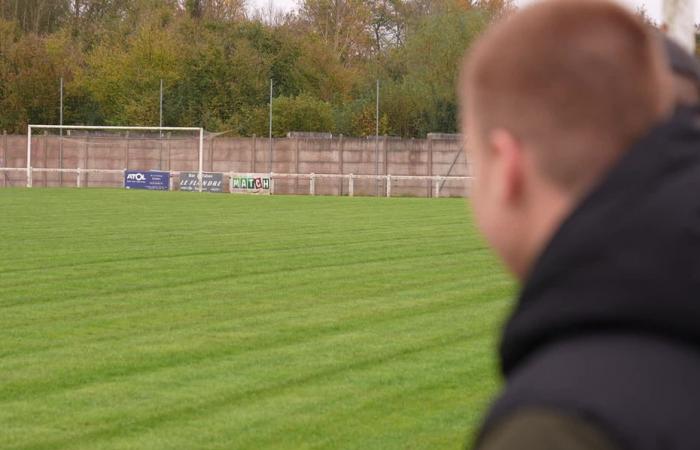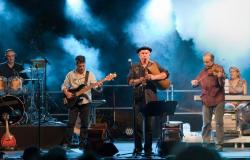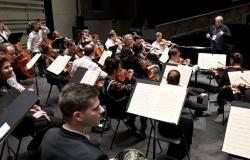
The number of cases handled by the disciplinary commission of the Somme football district is increasing. Following the “weekend without football” at the beginning of November, the prefect of the Somme convened a round table to discuss this phenomenon and establish an action plan.
The essentials of the day: our exclusive selection
Every day, our editorial team reserves the best regional news for you. A selection just for you, to stay in touch with your regions.
France Télévisions uses your email address to send you the newsletter “The essentials of the day: our exclusive selection”. You can unsubscribe at any time via the link at the bottom of this newsletter. Our privacy policy
Around a large table, this Tuesday, November 19 at the Somme prefecture, the president of the football district, Pascal Tranquille, exchanges with the president of the association of mayors of the department, the commanders of the national police and the gendarmerie, as well as the prefect and representatives of local communities.
Objective of this dialogue: to take stock of the violence and incivility in the Samarian football environment and decide on an action plan to deal with it. The event follows the “weekend without football” decreed by the football district from November 9 to 11. But beyond the strong declarations, it is difficult for the moment to see the measures which will follow this political communication operation.
Pascal Tranquille notes the deterioration of the atmosphere in football clubs. “Two seasons ago, the disciplinary commission investigated four cases. Last year, there were eight files, this year, a third of the way through the season, there are already 18 files submitted for investigationdeplores Pascal Tranquille. Our concern is based on three points, the increasingly repetitive frequency of these facts, their seriousness and the age categories concerned, which are increasingly young.“
It was to raise awareness that he decided to suspend matches and training last week. A reaction to the deterioration of exercise conditions in the Somme, the press release issued to explain the suspension of activity thus evoked a particularly difficult weekend of November 1, with 43 exclusions from the field and 437 warnings in forty-eight hours.
But Pascal Tranquille also alluded to a deplorable incident that occurred in the south of France to justify his decision: the burning of the cars of two educators from a football club. This climate of concern leads the district to take new measures. “The committee will soon decide on the doubling of sanctions“, announces the president of the district. He therefore welcomes the desire of the prefect of the Somme to bring together all the actors who could be concerned around the table.
“Our objective was to make a diagnosis of the situation and it is not goodindicates for his part Rollon Mouchel-Blaisot, prefect of the Somme. The diagnosis will be extended to other sports. For now, we have decided to develop an action plan involving the prosecutor and the administrative police, so that we can react.“The prefect promises a meeting with all the football clubs, which will undoubtedly be held on the occasion of the district general assembly,”before the end of winter“.
For Rollon Mouchel-Blaisot, this future action plan is structured around three axes: prevention, via these dialogue actions, support, with “resources, training, tools, brochures” for those involved in sports practice and finally, repression. In this last area, he indicates that “we can act on subsidies, as for associations, by verifying the republican nature of club activities“. A threat that he qualifies, however, reassuring the president of the football district: all this will be done in partnership with this organization.
The possible suspension of subsidies is mainly a matter for the municipalities; the president of the Somme mayors’ association, Bénédicte Thiébaut, was also seated around the table. She also mentions possible financial penalties “if problems multiply in certain clubs.“
The action plan should be formalized by June. A press release covering the main points of this first meeting will soon be published by the Somme prefecture.
Concretely, the president of the Somme football district hopes that the involvement of the State and the police will allow a strengthening of disciplinary measures. “If it is the prefect who issues a stadium ban, we will be sure not to see the person concerned at the matches“, Pascal Tranquille projects. If the number of facts reported by the football district is undeniably increasing, what about their seriousness? Pascal Tranquille will not provide details on the question.
Around the table, a commander from the Somme national police department is invited to provide her analysis of the phenomenon. A diplomat, she emphasizes that this must of course be taken seriously, however in the national police zone, “we do not see a significant increase in incidents, we have around ten incidents per year concerning sport, mainly league 2 level football.“It indicates, however, that the national police only intervene in urban areas and that the facts must be reported by calling 17, which implies a certain level of seriousness.
In the gendarmerie zone, which covers rural areas, “we have observed five facts in eleven months, four of which concern footballindicates the gendarmerie commander participating in the meeting. When matches are considered ‘at risk’, patrols are reinforced around the stadiums, all things considered: we are at the level of a campaign match.“
Asked about the matches behind closed doors, the president of the football district acknowledges that only two Amiens clubs are concerned, discussions are said to be underway concerning a third club. The Somme has 168 football clubs with 24,613 licensees. The 18 cases currently investigated by the disciplinary commission therefore represent 0.07% of licensees. The 437 warnings issued on November 1 concern 1.78% of players.
Faced with incivility, the Somme football district decided on a weekend without football from November 9 to 11: a decision difficult to understand for some practitioners.
•
© FTV
It’s probably already too much. But this material reality offers a striking contrast with the muscular declarations of the prefecture and the alarmist observations of the president of the football district. The sociologist specializing in football Nicolas Hourcade thus indicates, through multiple interviews, that “in the language of the stands, the insults are recurring“or even that, concerning the phenomenon of homophobic insults thrown by supporters, that he”there is no amplification, it has been a constant phenomenon for decades.“
Other sociologists have devoted work to “disruptive behavior” in the practice of football, emphasizing in particular that the context of competition between two groups favors the transgression of the rules of the game, to obtain an advantage or react to a disadvantage, despite a conviction. moral and formal of these practices.
If the dysfunctional aspects of the practice of football and its environment have been able to become objects of university study, it is because the phenomenon is old, generalized and perhaps even structural. This in no way means that this intrinsic violence is acceptable. But what is more recent are the resounding announcements from political staff on insecurity in sporting practice. A few weeks ago, for example, the Ministers of the Interior and Sports competed in announcing measures to strengthen controls in stadiums, after a new case of homophobic chants at the Parc des Princes.
In the Somme, the prefect and the district president announce their desire to strengthen their support for club supervisors: this will undoubtedly be welcome, if concrete actions result from the round table organized this November 19. Ditto for the strengthening of sanctions against problematic supporters, players and managers. What questions, on the other hand, is the disproportion between the means mobilized and the materiality of the facts stated, however unpleasant they may be.





